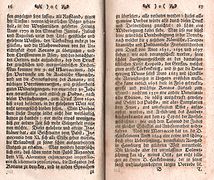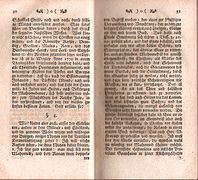The Turkish Bible, or the Koran
The Turkish Bible, or the Koran , published in 1772 , is the oldest German translation of the Koran directly from Arabic . The translator is the Frankfurt high school professor David Friederich Megerlin (1699–1778).
In the preface, Megerlin justifies his translation against the reservations of the Catholic Church that one can get to know the Koran as a “ book of fables ” and convince oneself of its falsehood. For Megerlein Mahumed is the “ false prophet ” and antichrist because “ he does not profess Christ as mediator of salvation , does not accept the mystery of the Trinity , the sacraments of the new covenant , and the order of salvation to be saved through faith to this end, propagates his political pseudo-religion with weapons wherever he can ”. The Turkish Bible helps "to get to know Mahumed and his book of lies better and to ask God to soon put an end to this violent kingdom and its superstitious religion in the Koran" .
This enemy image affects the translation. A review signed by CB in which the translation is compared with another can be found in the 17th volume of the journal "Allgemeine Deutsche Bibliothek" from 1772. A brief overview of various reviews of this volume, presumably written by Goethe , was published on December 22nd, 1772 in the Frankfurt scholarly advertisements . There it says that the review of CB is short compared to other reviews of the 17th volume: “ This wretched production [Megerlins] is dealt with shorter [by the critic CB]. We wish that another one would be made under an oriental sky by a German who read the Koran in his tent with all the feeling of being a poet and a prophet, and who had enough sense of anticipation to embrace the whole ”.
- Foreword: Pages 16–17 and 24–31
Web links
- Full text , The Turkish Bible, or the Koran , Megerlin 1772, 2009 digitized by the Bayerische Staatsbibliothek
- Full text as a digital copy , The Turkish Bible, or the Koran , Megerlin 1772, SLUB Dresden
- Full text as digitized version , The Turkish Bible, or the Koran , Megerlin 1772, digitized by Google Books
- OCLC 165572623 : Book details on WorldCat at the Online Computer Library Center (OCLC).
Individual evidence
- ↑ site Horst Kannemann: Wetzlar - after Goethe year
- ↑ Pages 7 to 36: Honored and highly inclined, truth and erudition loving readers!
- ↑ Pages 16 and 17: Already Marracci, confessor of Pope Innocent XI. , Struggled in his Quran translation in 1698 into Latin of the ban by Pope Alexander VII. To print the Koran, or translated into other languages, with three " freedom letter to the pressure " in 1691, and in 1695 and 1697 a " Zueignungschrift " to Emperor Leopold . Already in 1530 a " Venetian Edition " was sacrificed to the fire on the orders of the Pope, with reference to the " Magic Book Brand " from the Acts of the Apostles ( Acts 19.19 EU )
- ↑ Page 26: the more ghastly its figure, the more one has to beware of it, and the closer its prophesied ... end is: the more and the more correctly one should also know this book of fables and learn to convince oneself of its falsehood .
- ↑ Page 25: that Mahomed is the Apoc. 13 ( Rev 13 : 1-18 EU ) indicated beast, the false prophet and greatest antichrist, as this personal and real antichrist exactly corresponds to the number 666 , ...
- ↑ page 31
- ↑ page 29
- ↑ CB: Megerlin's Turkish Bible, or the Koran's very first German translation from the Arabic original . In: Friedrich Nicolai (Ed.): General German Library . tape 17 . Friedrich Nicolai, Berlin 1772, p. 426 ( limited preview in Google Book search).
- ↑ Olav Krämer: JWL Gleims Halladat or Das rothe Buch . In: Stefan Hermes & Sebastian Kaufmann (eds.): The whole human being - all humanity. Ethnological anthropology, literature and aesthetics around 1800 . Walter de Gruyter, Berlin 2014, ISBN 978-3-11-030766-5 , p. 77 ( limited preview in Google Book search).
- ^ German General Sunday Gazette September 1, 2000 No. 35/2000 Albrecht Metzger: The Koran - Forever inviolable? ( Memento from December 15, 2000 in the Internet Archive )
- ^ Contributions to the Frankfurt scholars advertisements from 1772 by Johann Wolfgang von Goethe - text in the Gutenberg project





